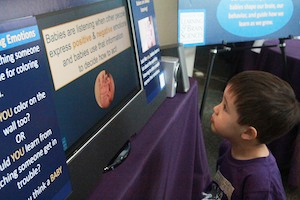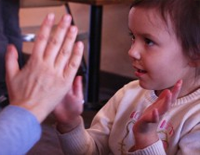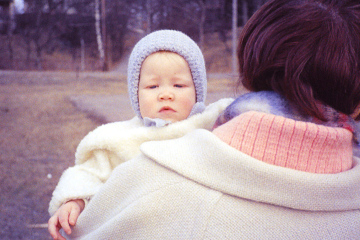For the third straight year, the I-LABS Outreach & Education team will present fun, interactive exhibits at the Pacific Science Center during the University of Washington PAWS-On Science Husky Weekend. See our newest exhibit demonstrating that babies are learning by watching the emotional interactions of people around them. Parents and children of all ages are invited to see hundreds of science exhibits … Read More
I-LABS Co-Directors Named ParentMap Superheroes
I-LABS Co-Directors, Patricia Kuhl and Andrew Meltzoff, have been named as 2014 Superheroes by ParentMap magazine. Every April, ParentMap highlights “amazing individuals [who] are making our lives better and our communities stronger through science, poetry, community service, activism and raising awareness.” Pat Kuhl and Andy Meltzoff, a happily married couple of 28 years, are both big thinkers and big dreamers. Their … Read More
Vroom pilot launch gives parents tips on boosting babies brain power
Vroom is a new campaign to help parents understand the importance of interaction and everyday moments in boosting their young children’s brain development. I-LABS supports the science-based messages to parents in the campaign. Learn more about Vroom. The Seattle Times featured the pilot launch of Vroom in South King County. Read the Seattle Times story. Over the past dozen years, scientists have made … Read More
Why bilingualism is child’s play
In this article from the South China Morning Post by Annie Ho, Patricia Kuhl and Andrew Meltzoff’s recent visit to Hong Kong and the talks they gave are discussed. A power couple in neuroscience, professors Patricia Kuhl and Andrew Meltzoff were in Hong Kong recently to give a talk on their respective areas of expertise – emotional quotient andintelligence quotient – … Read More
Parental language to infants — it’s quality not quantity
A new discovery to be published in the journal Developmental Science reports that speech directed to 11- to 14-month-old infants predicts both their concurrent and future language accomplishments, and points to practical information useful for parents. The first factor linked to success in language is the use of “parentese” (rather than standard adult-directed speech). The second factor predicting success is … Read More
I-LABS Research Cited by Thought Leaders
By George Halvorson For the past several days, I have been writing pieces that say that if we want to reduce the number of people in prison and reduce the number of people who drop out of school because they can’t read, we need to help children from birth to three years old exercise their brains.Why have I believed that … Read More
I-LABS research published in PLOS ONE: I’ve got you under my skin
New research by I-LABS Co-Director Andrew Meltzoff and his colleagues Joni Saby and Peter Marshall is the first to show that babies’ brains are activated in particular ways when an adult performs a task with different parts of her body. The research published in the PLOS ONE shows that when 14-month-old babies simply watched an adult use her hand to … Read More
New research highlights importance of live interaction for children
New study has found that children are able to learn more effectively through live interaction and video chat technology. A new study conducted by the UW, Temple University (TU), and the University of Delaware (UDEL), has found that children are able to learn more effectively through live interaction and video chat technology such as Skype, as opposed to watching a … Read More
Don’t just talk. Listen to your baby too
New campaigns to increase the number of words young children hear should focus on real conversations too. By Lisa Guernsey If you’re a parent, you can’t miss the hot new thing in early education: words. Talk to your baby, and you close the education gap, goes the theory. Early language experiences, myriad studies show, help form the foundation for children’s learning and their … Read More
United Way puts on ‘Building Baby Brains’ event
United Way hosts special guest Dr. Sarah Roseberry from the Institute of Learning & Brain Sciences. Clallam County’s United Way this week hosts special guest Dr. Sarah Roseberry from the Institute of Learning and Brain Science to give a talk entitled, “Building Baby Brains: The Importance of Everyday Experiences.“ The presentation is from 5-6 p.m. Friday, Oct. 18, at First … Read More








